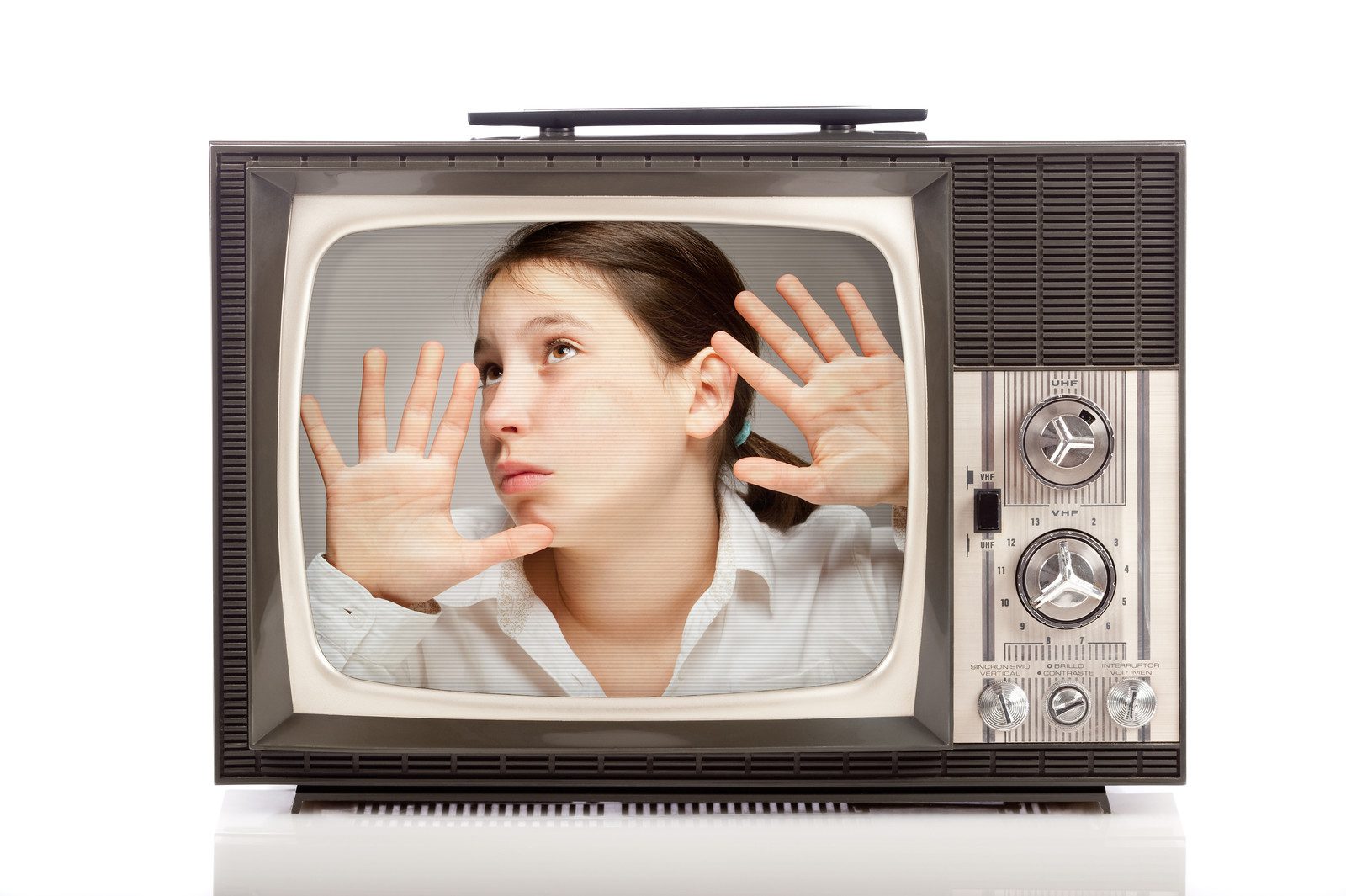How to Talk to Your Child About Provocative Celebrity Performances

Posted in: Grade School, Teenagers
Topics: Culture + Society
Before Miley Cyrus’ provocative performance on the MTV Video Music Awards in late August, many parents were still trying to understand the whole Hannah Montana/Miley Cyrus paradox. You know—Do the other characters on the show know that it’s the same person? How did a show with such silly storylines become so popular? And so forth…
In other words, the usual stuff.
But, then came the now well-publicized performance at the MTV VMAs, and suddenly, parents had new things on their collectively curious and worried minds. What, for example, is “twerking?” And, does it differ at all from “really fast gyrating?” And, most importantly, given that she’s still Hannah Montana to my 8-year-old daughter, how in the world do we talk about this whole event?
Well, let’s start with what not to do.
I wouldn’t just wander around the Internet with your little one and watch all those MTV videos together. That’s not the same thing as saying that your little one won’t ever see those videos at all, but sitting down and exploring the issue in a free-floating digital manner is probably taking you nowhere good. You’d like more control over what pops up on the screen. I know this might sound obvious, but we have such a tendency to look for information on our computers that many might be tempted to cooperatively explore the issue with our kids in cyberspace. Believe me, you’ll end up having to explain a lot more than “twerking” if that’s the route you choose.
Concretely, then, what are we to do? How are we to make sense for our pre-teens and teens the recent Miley Cyrus events?
I can’t and don’t want to say anything clinical about Ms. Cyrus herself. I haven’t talked to her directly, and even if I had, it would be unethical and improper of me as a clinician to take the conversation in that direction.
Plus, I don’t think that’s really what our kids are looking for when they ask us about the recent Miley Cyrus performance. I think our kids are wondering where we draw our own lines. They are pondering, if you will, the place where we demarcate behavior that we find acceptable, and, on the other hand, behavior that we find objectionable. Most poignantly, they’re wondering whether we have room in the middle to negotiate these poles. In other words, they look to us first before making their own judgments on matters such as these.
They’re also trying to process not only the MTV performance, but the radical transformation of a teenager they idolize and long to be like. The question is: What happened to Hannah?
As a general rule, you want to complicate the thinking of your kids—help your children to ask questions, to wonder and ponder, and to support their conclusions. In doing so, be sure to match your inquiry with your child’s age and developmental capacities.
To an 8-year-old, this was a bizarre moment. Hannah Montana, previously the ultimate symbol of wholesome femininity, an ideal for young girls, was suddenly rated R. Miley Cyrus was suddenly taboo. Kids have keen radars for the forbidden, and if your child happened to have seen the videos already, start by asking her what she thinks. Here are some good starting questions for your pre-teen (but, don’t ask them in rapid fire, give her time to think):
Who is Hannah Montana? What kind of person is she? What does she mean to you?
And now, who is Miley Cyrus? What do you think of her? Could she be the same person? How could this be? Why would she act that way?
Isn’t this confusing?
Well, it turns out that it’s confusing to many adults as well. Just look at some of the faces on the women in the audience at the performance.
It’s perfectly fine to let your child know some basics. First, point out that Ms. Cyrus is a performer. As such, she will sometimes perform in ways that are aimed at different ages, and at different roles she is playing. You can also say, if you feel this way, that you are uncomfortable with Ms. Cyrus’ performance.
You can then move to ask your little one whether Miley Cyrus always acts like she did on the VMAs. What would it be like if she did? What if she didn’t?
I know…we’re still ducking a fundamental issue. What, your sweet little daughter asks you, is “twerking?” At this point, the cat is out the bag, so to speak. She knows the term. My advice? Just tell her. Straight up tell her, and perhaps, even in an understated way, demonstrate for her what you understand “twerking” to be. (For this, you may need the Internet, but again, do this research on your own). Remember, if she already knows the word, if she’s already seen photos of the show, then anything you don’t say will allow her to imagine something a hundred times worse. For most preadolescents, there will be lots of giggling and an understanding at some primitive level the intentions of the behavior. It’s not all that different from talking about sex, and having your daughter ask about oral sex, or safe versus unsafe sex. Sometimes, we do need to be explicit when we discuss issues that are difficult for us to openly ponder. Then, I bet your kid will drop the subject. If she asks you why someone would ever “twerk” in the first place, tell her that it was part of Ms. Cyrus’s act, and that this was an act intended for adults—not one you would like your sweet daughter to imitate. That ought to settle things down.
For teens, the discussion gets more complicated. This is good, because we want to complicate their thinking even more. After all, they are more mature and intellectually prepared to take on bigger and tougher issues.
Most teens think of Miley herself as a teen. (She will actually turn 21 in November). And, your teen will undoubtedly notice the clear sexual nature of Miley’s act. Why not ask questions like: Why is it that child stars who become young adults act more sexually and provocatively? Think of Britney Spears from the Mickey Mouse Club, among others.
What are the social norms about female pop singers in particular? Why do they need to not simply be sexy (after all, most young adults want this), but so outright daring and provocative?
Is this just about women? How did Justin Timberlake achieve his stardom? He was, after all, in the Mickey Mouse Club with Britney Spears. Was sexual or forbidden behavior involved? How did his climb to stardom differ from hers? Why is blatant sexuality so important for the image of a rock star in our culture? Can you think of some starlets who are not so explicit sexually?
What does this tell us about our society, and the demands it puts on us? Would you want to act that way to become famous?
So, you can acknowledge what your teen has noticed. Not a lot of teens want to talk to their parents about overt acts of provocative sexual behavior. Still, it would make sense to remind your teen that you are there if she has further questions, and then discuss with her the same issues that you did with your preadolescent. We don’t “twerk” all the time because we don’t want other people to think that this is how we define ourselves. We want to think of ourselves as more complicated than our simple sexual provocations. Then remind your teen, as you did with your younger one, that Miley Cyrus was simply doing a show. She was playing a part, and pushing the boundaries. You can ask your teen about the pluses and minuses of these kinds of incidents. How did this help Ms. Cyrus? How did it hurt her?
In the end, these events are actually more familiar than not. In the mid 1950s, Frank Sinatra said that Elvis Presley’s music was “deplorable,” noting that it fostered “almost totally negative and destructive reactions in young people.” Celebrities have been provocative for a long time. Remember John Travolta in Saturday Night Fever? That is, in a sense, what some celebrities do. I don’t think there will ever be a day (nor do I want one) when we don’t have the chance to talk with our kids about the antics of their heroes. We just have to keep the dialogue going.
Was this post helpful?
Newsletter
Subscribe Today
Your monthly dose of the latest mental health tips and advice from the expert team at The Clay Center.
SubscribeMultimedia
Quick Jumps
Tag Cloud
-
addiction
ADHD
adolescents
anorexia
anxiety
autism
behavior
CBT
child development
children
college
communication
covid-19
depression
digital media
dyslexia
eating disorder
evaluation
family
fear
healthy development
learning
learning disabilities
learning disability
mental health
mental illness
parenting
parents
Podcast
PTSD
relationships
resilience
school
shrinking it down
social media
stigma
stress
suicide
technology
teenagers
teens
therapy
trauma
treatment
violence

 Share
Share Tweet
Tweet






